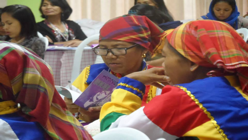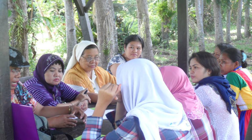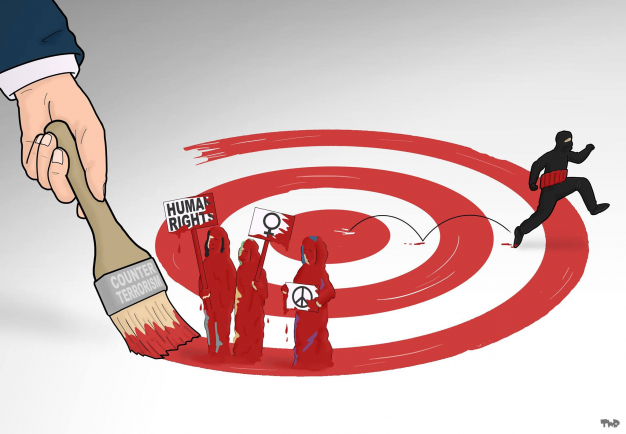By Jasmin Nario-Galace - Center for Peace Education at Miriam College, the Philippines
The recent signing of the Framework of Agreement on the Bangsamoro is a significant step towards the realization of peace in Mindanao. Acknowledging this opportune moment to strengthen women’s meaningful participation to achieving peace and stability in Mindanao, the Women Engaged in Action on 1325 (WE Act 1325), with support from the Australian Agency for International Development (AusAID), is currently implementing the project called “Women Working for Normalization”.
 Normalization is described as a process where communities can return to conditions where they can achieve their desired quality of life. The concept of normalization is one of the major parts of the Framework Agreement on the Bangsamoro signed by the Government of the Philippines and the Moro Islamic Liberation Front on 15 October 2012.
Normalization is described as a process where communities can return to conditions where they can achieve their desired quality of life. The concept of normalization is one of the major parts of the Framework Agreement on the Bangsamoro signed by the Government of the Philippines and the Moro Islamic Liberation Front on 15 October 2012.
This project was conceived in support of the peace process in Mindanao. The region has suffered from armed conflict for almost half a century. Estimates place war-rated deaths at 120,000. The conflict resulted in countless displaced people and has disrupted schooling and livelihood in particular and development in general. In 2012, the government and the Moro Islamic Liberation Front signed a breakthrough agreement. The agreement contained a provision on the right of women to have meaningful participation in the regional peacebuilding activities. WE Act 1325 wants to ensure that women participate in peacebuilding and the promotion of security in the area given their unique perspectives and experience. The project wants to see women actively taking part in conflict prevention, resolving conflicts in the community, monitoring human rights and international humanitarian law violations, and advocating for arms control by capacitating them on these skills for nonviolent change.
 The project of We Act 1325 has two components: capability-building and consultation. The capability-building component is meant to help enhance knowledge of participants on issues that will empower them to meaningfully participate in the process of normalization or in helping promote security in their communities. Capability-building focuses on normalization related concepts such as Human Rights and International Humanitarian Law; conflict resolution and mediation; arms proliferation and misuse; early warning and early response; and gender rights in the context of religion and culture.
The project of We Act 1325 has two components: capability-building and consultation. The capability-building component is meant to help enhance knowledge of participants on issues that will empower them to meaningfully participate in the process of normalization or in helping promote security in their communities. Capability-building focuses on normalization related concepts such as Human Rights and International Humanitarian Law; conflict resolution and mediation; arms proliferation and misuse; early warning and early response; and gender rights in the context of religion and culture.
On the other hand, the consultation aspect focuses on the issues of transitional justice, decommissioning and arms control. The inputs and perspectives of the women are conveyed to the Transition Commission and to the peace panels to ensure that women’s perspectives on peace and security will be adequately reflected in the Basic Law.
 This project is currently being implemented in four ARMM areas namely Cotabato, Lanao Province, the island provinces of BaSulTa and Zamboanga. Participants are Moro, IP and Christian women from the academe, civil society, community, media, religious institutions and the local government units.
This project is currently being implemented in four ARMM areas namely Cotabato, Lanao Province, the island provinces of BaSulTa and Zamboanga. Participants are Moro, IP and Christian women from the academe, civil society, community, media, religious institutions and the local government units.
WPP members Center for Peace Education and AKKAPKA are involved in this project.
Jasmin Nario-Galace is Executive Director of the Center for Peace Education and Professor at the College of International, Humanitarian and Development Studies in Miriam College. She has been an active member of the WPP Asia Network, and contributed to various WPP publications. She is National Coordinator of the Women Engaged in Action on 1325 (WE Act 1325), a national network of women in peace, human rights and women’s organizations which helps implement the National Action Plan on UN Security Council Resolutions 1325 and 1820. She is Co-Chair of the International Advisory Council of the International Action Network on Small Arms (IANSA) and the Asia Regional Lead of the Control Arms Coalition. She is also in the Steering Committee of the Global Network of Women Peacebuilders (GNWP). She is in the Steering Committee of the Philippine Action Network to Control Arms (PhilANCA) and the Sulong CARHRIHL, a third party network that monitors the observance of the Government and the National Democratic Front to their agreement to respect human rights and international humanitarian law. She is also a Member of the Board of the Philippine Council for Global and Peace Education.
11 Dec '17 This month WPP staff interviewed Arbia Jebali and Sarah Chamekh from Free Sight Association in Tunisia about the work their organization does, how civil society space has changed over the years, which challenges they are facing now, and how civil society in Tunisia is organizing itself to overcome those challenges.
7 Nov '17 In this article, WPP staff interviewed Doron Joles of XminY Fund, an activist organization that supports social movements, action groups and changemakers fighting for a fair, democratic, sustainable and accepting world. He discusses the unique way they have chosen to hand out funds, and the challenges that go along with funding small activist organizations in the current global climate.

25 Oct '17 This Friday, the UNSCR 1325 Open Debate will take place once again, seventeen years since the adoption of landmark UN Security Council Resolution 1325 on Women, Peace and Security. In this article WPP staff reflects on the progress made for a truly transformative feminist peace agenda until now.
